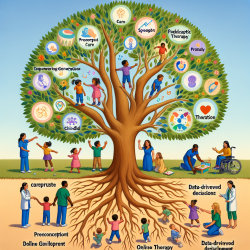Introduction
In the ever-evolving field of speech-language pathology, staying informed about the latest research can significantly enhance our practice and outcomes for the children we serve. A recent study titled Prevalence and social determinants of psychological distress among people who use drugs in Cambodia provides insights that can be leveraged to improve therapeutic approaches, especially in resource-constrained settings.
Key Findings from the Study
The study conducted in Cambodia highlights a high prevalence of psychological distress among people who use drugs, with significant gender and age disparities. Notably, women and older individuals (25 years and above) exhibited higher levels of distress. The study also identified adverse childhood experiences (ACEs) as a critical factor contributing to psychological distress.
Furthermore, the study found that institutional experiences, such as drug rehabilitation, often exacerbated psychological distress rather than alleviating it. Conversely, individuals with stable living conditions and supportive care during illness reported lower distress levels.
Implications for Practitioners
As practitioners, these findings underscore the importance of adopting a holistic and data-driven approach to therapy. Here are some actionable insights:
- Gender-Sensitive Interventions: Tailor interventions to address the unique needs of female clients, who may face additional stigma and discrimination.
- Focus on ACEs: Incorporate strategies to identify and address adverse childhood experiences, which can have long-term impacts on mental health.
- Age-Sensitive Approaches: Design interventions that cater to the specific challenges faced by older clients, who may have more entrenched psychological issues.
- Community-Based Programs: Advocate for and participate in community-based rehabilitation programs that provide supportive environments without the negative impacts of institutionalization.
Encouraging Further Research
The study highlights the scarcity of research on mental health among drug users in resource-limited settings. Practitioners are encouraged to engage in further research to explore the intersection of drug use, mental health, and therapy outcomes. Such research can inform policy changes and the development of more effective intervention programs.
Conclusion
By integrating the insights from this study into practice, speech-language pathologists can enhance their therapeutic approaches, ultimately leading to better outcomes for children and other vulnerable populations. The importance of data-driven decisions cannot be overstated, and ongoing research will continue to illuminate paths to improved care.
To read the original research paper, please follow this link: Prevalence and social determinants of psychological distress among people who use drugs in Cambodia.










